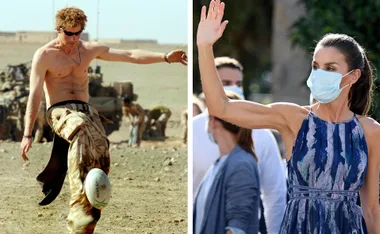When Phoebe Waller-Bridge asserted in Fleabag, “Hair is everything! We wish it wasn’t so we could actually think about something else occasionally,” we felt seen.
It hits at the core of what hair means. For many women, our identity is connected to things like a polished hairstyle as it helps us feel confident and feels a part of our identity, even when the world deems women’s interests as frivolous.
Royal women have inspired hairstyles since even before Princess Diana, and when Queen Victoria reigned from 1876 to 1901, her hair was integral to her image for ceremonial display and private ritual.
These days, royal women are more likely to get their hair crafted into more fashionable cuts and hues that can be easily replicated at your local hairdressers.
Recently, Princess Sofia of Sweden debuted a 70s curtain fringe that was undoubtedly inspired by a resurgent trend that Gen Z have been obsessing over on popular video sharing platform, TikTok.
While Sofia has been experimenting with her look, other royals like Kate Middleton and Meghan Markle have been playing with length and layers.
There are bounds of royally iconic hairstyles that have come out of 2021, and there is something classic, edgy and even avant-garde for everyone’s taste.
For some inspiration, scroll through the royal hairstyle trends that have breathed life into 2021.

Princess Sofia
Princess Sofia of Sweden
Sofia’s 70s inspired curtain bangs are very much on trend after the hairstyle went viral on TikTok in 2021.

Kate Middleton
The Duchess of Cambridge, Kate Middleton
Long layers are back after taking a hiatus to make way for blunt cuts. The trend is great for summer 2021 because it creates a sense of lightness.

Princess Kate
This picture shows off Kate’s subtle baby lights, which brightens her locks without distracting from her natural colour.

Meghan Markle
Duchess of Sussex Meghan Markle
The hairstyle Meghan wore during her interview with Oprah also takes inspiration from TikTok. The middle part and loose strands framing her face calls to the Gen Z claim that middle parts are in and side parts are out.

Meghan Markle
During her pregnancy with Lilibet Diana, Meghan let her hair grow longer than we have ever seen it. The loose curls are especially on-trend (as seen on Kate Middleton). It suggests she and many others are opting for functional hair over intricate styles.

Mary Princess
Crown Princess Mary of Denmark
This year, Crown Princess Mary of Denmark indulged in delectably dark shades of hazel brown. 90s trends have has a resurgence in 2021 – that was a time when women like Winona Ryder, Cindy Crawford, and Kate Moss were dying their dark hair shades of brown – so this could be deemed Mary’s grunge hair era… almost.

Princess Mary
The royal has also been experimenting with low ponytails, which are a classy take on the hairstyle.

Amelia
Lady Amelia Windsor
This fashionable royal is sticking to balayage, which is the hair trend that has never gone away since 2013 – and for a good reason.

Lady Amelia
Here is a closer look at her blonde balayage, which is growing out naturally.

Latitiza
Queen Letizia of Spain
Like Princess Mary, Letizia is also enjoying dark colours. This brown colour is so dark it’s almost black, making for a very classy and regal aesthetic.

Queen Latitiza
The sun is capturing the lighter brown baby lights that are patterned around Letizia’s hair. It’s a subtle detail that brings depth to the colour and elevates its effect.

Charlotte Casiraghi
Charlotte Casiraghi Rassam
Ah! It’s a classic French woman move of Charlotte to style her hair casually, and it looks perfectly accidental. Charlotte’s messy bun is devastatingly elegant and unbothered. It calls to the 2021 trend that embraces a more natural look after a very stylised 2010s.

Charlotte
When her hair is down, Charlotte has long waves and layers.

Princess Charlene
Princess Charlene of Monaco
This is by far one of the edgiest and gender-fluid haircut to be donned by a royal. This crew cut is for those who are brave enough to experiment with such a strong look. The hairstyle fits perfectly within the emergence of more gender-fluid styling that breaks away from traditional restrictions.

